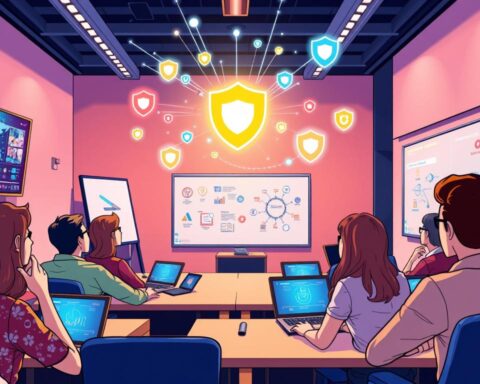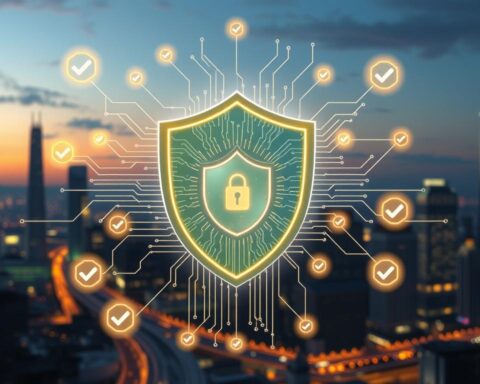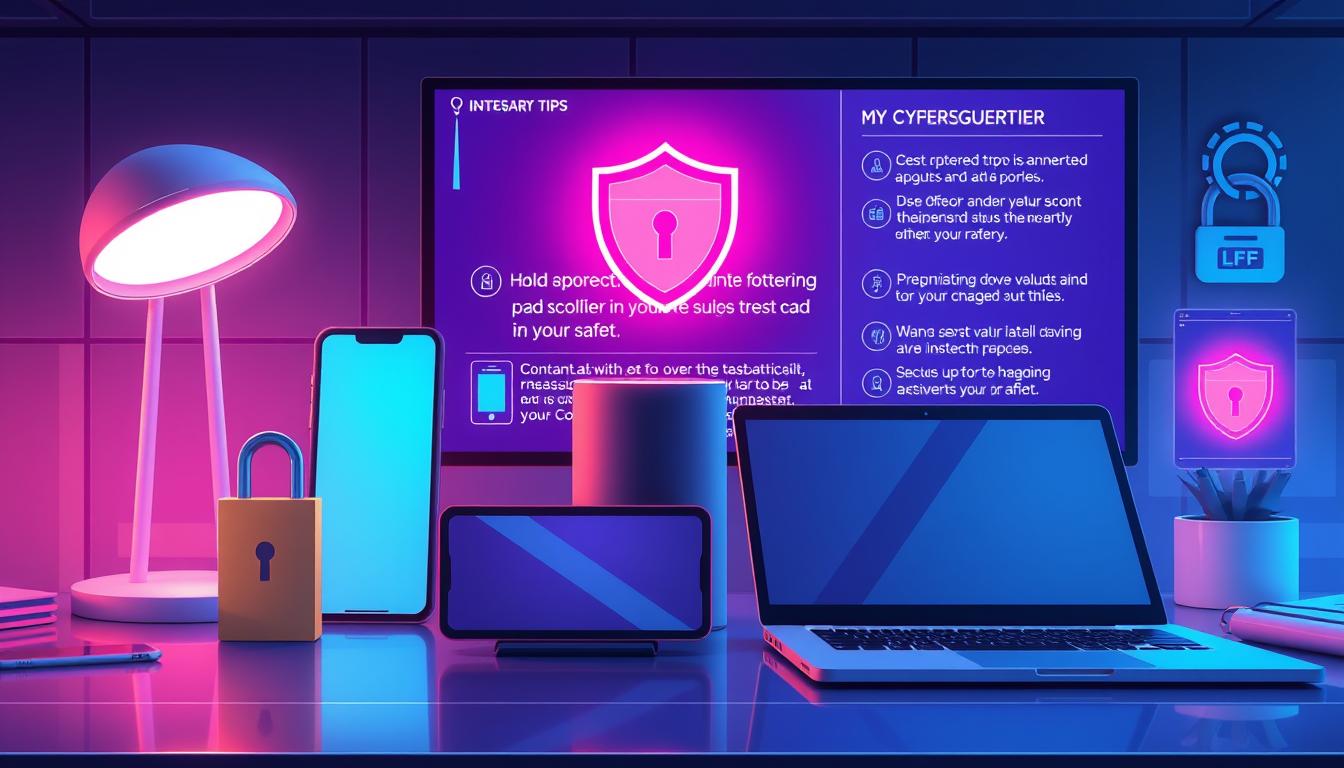A surprising 85% of all data breaches involve human interaction. This shows how key it is to strengthen your credentials and focus on professional growth in cybersecurity1. As we move through the digital world, having the right skills and knowledge is vital. It helps protect us and our organizations from cyber threats. By checking out cybersecurity tips and resources, you can boost your cybersecurity skills and stay safe from threats.
With more cyberattacks happening, having strong cybersecurity skills is now a must for career growth. By improving your credentials and investing in your professional development, you can greatly improve your career chances. This also helps make the digital world safer for everyone1.
Key Takeaways
- Strengthening your credentials is essential for career advancement in the cybersecurity field
- Professional development and continuous learning are critical for staying ahead of cyber threats
- Investing in cybersecurity credentials can significantly enhance career prospects
- Cybersecurity threats are becoming increasingly common, with 85% of all data breaches involving human interaction1
- By prioritizing cybersecurity and investing in professional development, individuals can contribute to a safer digital environment
The Critical Role of Professional Credentials in Cybersecurity
Professional credentials are key in the cybersecurity world. They show a person’s skills and knowledge. Getting certifications and training can really help your career grow.
For example, Security+ Certification covers important topics like risk management and incident response2. This and other certifications like CEH and GSEC are great for beginners. They help establish expertise in cybersecurity2.
The demand for cybersecurity skills is high, with over 3.5 million job openings in the US by 20253. This is because of more cybersecurity breaches, which cost companies a lot of money3. Companies are spending more on cybersecurity, looking for professionals with strong credentials3.
Some important certifications include:
- Security+ Certification
- CEH (Certified Ethical Hacker) certification
- GSEC (GIAC Security Essentials Certification)
These certifications give you an edge in the job market. Many companies need certified professionals for important roles2. Investing in credentials can boost your skills and chances of success in cybersecurity2. For more on cybersecurity certifications, check out this resource.
In summary, professional credentials are vital for growing your career in cybersecurity. By focusing on skill enhancement, you can stay ahead and reach your goals in this fast-changing field3.
Essential Cybersecurity Certifications for Modern Professionals
Cybersecurity experts can boost their skills with certifications like CompTIA Security+ and CISSP. These are highly respected in the field4. They show you know a lot about keeping systems safe, which can lead to better jobs and higher pay. For example, getting the CompTIA Security+ certification costs $404. Jobs like systems administrators can earn up to $89,915, while security engineers can make $157,4964.
Getting more advanced in your career in cybersecurity is key. The CISSP certification, which costs $749, can lead to salaries of $217,127 for top security officers and $157,496 for security engineers4. Other certifications, like the Certified Ethical Hacker (CEH) and Certified Information Security Manager (CISM), also offer great returns on investment.
Some of the key certifications and their average salaries include:
- CompTIA Security+: $89,915 – $157,4964
- CISSP: $81,959 – $217,1274
- Certified Ethical Hacker (CEH): $104,548 – $234,8814
These certifications not only show you’re an expert but also give you an edge in finding a job. They are vital for anyone working in cybersecurity today5.
Building Your Educational Foundation
Getting a solid educational base is key for moving up in cybersecurity careers. You can build this base through degrees, training courses, and online learning. Investing in your skills and knowledge opens up better job opportunities6.
Benefits of a strong educational base include better time management and goal setting. It also helps in working well with others and staying active6. Students who manage their time well tend to do better in school6.
In the U.S., over 738,000 credentials are available, showing the value of certifications7. States like Connecticut and Kansas are pushing for more transparency and rewards for these credentials7. People with these credentials often see their careers and pay improve8.
The table below shows some important facts about credentials and education:
| Statistic | Description |
|---|---|
| 738,000 | Number of credentials in the United States marketplace7 |
| 80% | Percentage of individuals who complete a Grow With Google certificate and report a positive career change8 |
| 20% | Percentage of working-age adults who report a nondegree credential as their highest level of education8 |
By focusing on skill-building and career growth, you can succeed in cybersecurity. With the right education, you can reach your career dreams and keep up with the fast-changing field6.
Practical Experience: The Cornerstone of Strengthening Your Credentials
Getting practical experience is key for those looking to boost their cybersecurity skills. It means getting hands-on training and real-world experience. This can greatly improve your skills and knowledge9. Studies show that those with more experience earn better and get promoted faster, showing the value of skill enhancement and credentials improvement9.
When it comes to finding a job, sharing your credentials matters a lot. 70% of employers like to see qualifications on professional sites10. Also, 85% of hiring managers say digital credentials help them judge candidates better10. Here are some benefits of practical experience:
- More chances for career growth through wider professional networks
- More confidence and success, leading to better pay and faster promotions
- Being seen more by recruiters, with a 60% increase in visibility for those who share their skills online10
By focusing on practical experience, you can get the skills and knowledge needed to boost your cybersecurity credentials. This leads to better job chances and career growth9. Career coach Nancy Collamer says most people go back to school to improve their skills and credentials, showing how important credentials improvement is9.

In summary, practical experience is vital for improving your cybersecurity credentials. It’s important to get hands-on training and real-world experience to boost your skills and knowledge9. This way, you can improve your career prospects and stay ahead in the field.
| Benefits of Practical Experience | Description |
|---|---|
| Enhanced Career Advancement | Expanded professional networks and increased visibility to recruiters |
| Improved Confidence and Success | Better wages and quicker promotions |
| Increased Visibility | Candidates who regularly share their achievements and skills online increase their visibility by 60%10 |
Developing a Strategic Professional Network
Building a strong professional network is key for professional development and career advancement in cybersecurity. A robust online network is vital for finding jobs and moving up in your career today11. Networking means creating and keeping relationships that help both parties grow, which is vital for your career11.
Many industries have professional associations, like marketing, healthcare, and tech11. These groups offer networking chances, learning opportunities, and support for your field. For those new to networking, joining groups like Toastmasters or BNI can be a great start11.
Having a LinkedIn profile opens up a world of networking with millions of users11. It’s seen as a key tool for building your brand and finding jobs11. Online networking is often cheaper than in-person events11. To learn more about the importance of rapid and continuous learning in professional growth, check out our website.
Operational networking helps improve how tasks are done and builds relationships with key people12. Personal networking looks for ways to advance by meeting people outside your company12. Strategic networking uses tools to find new chances and meet goals12. Companies mainly focus on operational networking, while associations help with personal networking12.
Here are some key benefits of developing a strategic professional network:
- Access to job opportunities and career advancement
- Continuing education and industry advocacy
- Cost-effective online networking
- Opportunities for personal and professional growth
By building a strategic professional network, you can boost your professional development and career advancement in cybersecurity11. Always follow up with new contacts and work on your relationships to grow your network11.
Creating Your Personal Development Roadmap
To boost your skills and improve your credentials, making a personal development roadmap is key. This roadmap should have clear, achievable goals. Experts say these goals should be specific, measurable, achievable, relevant, and time-bound (SMART)13. Setting SMART goals can help you reach your personal development goals by 50% or more14.
A good personal development roadmap can open doors to better career opportunities. Studies show that those with active mentorship see a 70% jump in career growth14. Also, joining industry associations can grow your professional network by 50-60%14.
Here are some important parts of a personal development roadmap:
- Short-term and long-term goals
- Mid-term objectives
- Resources for professional growth, like seminars and workshops
- Networking chances, including social media like LinkedIn
By following these steps and making a detailed personal development roadmap, you can greatly improve your skills, credentials, and career15.
Measuring and Documenting Your Progress
Tracking your progress is key for anyone aiming to grow in cybersecurity. It means keeping tabs on your achievements, building a portfolio, and using tools to spot where you need to get better16. This way, you can show off your skills to future employers.
Setting clear goals is a big part of tracking your progress. Start by looking at where you need to improve and make a plan to get there17. Also, ask for feedback from others to get new ideas and sharpen your skills.
Tools like those in the 2030 Skills Mission can help you find and fix your weak spots17. By keeping a record of your growth and successes, you show you’re serious about learning and getting better. This boosts your career chances.
| Skill Assessment Tool | Description |
|---|---|
| Self-Assessment | Identify areas for improvement and create a plan to address these gaps |
| 360-Degree Feedback | Receive feedback from supervisors, peers, and subordinates to refine skills |
| Digital Skills Passport | Document and showcase skills and achievements to future employers |
By tracking and recording your progress, you take charge of your career path16. This is vital for improving your skills, advancing professionally, and achieving career goals. It leads to more success and happiness in your work life.
Conclusion: Maintaining and Evolving Your Professional Standing
Professionals aiming for career advancement must focus on professional growth. They need to keep learning and getting new credentials to stay ahead in the job market18. This not only sharpens their skills but also increases their earning power by adding valuable credentials to their resume18.
Getting involved in professional development can help keep employees, as 94% would stay longer if their company invested in them18. Companies that offer these chances can also attract people who are dedicated to personal and professional growth. This leads to higher job satisfaction and better performance18. By improving their credentials and learning continuously, professionals can keep their standing strong, opening doors to better career opportunities and job satisfaction.
Keeping up with professional growth is key for career success and needs a commitment to ongoing learning and credentials improvement19. By staying current with industry trends, professionals can stay competitive and valued in their field. This leads to better salary talks and more job chances19.
FAQ
What is the importance of strengthening your cybersecurity credentials?
How do professional credentials impact career growth in cybersecurity?
What are some essential cybersecurity certifications for modern professionals?
Why is building a strong educational foundation important for a career in cybersecurity?
How does practical experience contribute to strengthening cybersecurity credentials?
What is the importance of developing a strategic professional network in cybersecurity?
How can creating a personal development roadmap benefit a cybersecurity career?
Why is measuring and documenting progress important for cybersecurity professionals?
What is the importance of maintaining and evolving professional standing in cybersecurity?
Source Links
- The Most Current Cyber Threats Faced by SMBs and the Latest Security Tips for Employees – https://www.linkedin.com/pulse/most-current-cyber-threats-faced-smbs-latest-security-brett-gallant
- The Top 5 Security Credentials: Your Path to Success – https://www.readynez.com/en/blog/the-top-5-security-credentials-your-path-to-success/
- What Type of Person Will Make a Good Cybersecurity Professional? – https://www.isaca.org/resources/news-and-trends/isaca-now-blog/2024/what-type-of-person-will-make-a-good-cybersecurity-professional
- 8 Popular Cybersecurity Certifications [2025 Updated] – https://www.coursera.org/articles/popular-cybersecurity-certifications
- 7 Best Cybersecurity Certifications to Have in 2025 – https://www.infosecinstitute.com/resources/professional-development/7-top-security-certifications-you-should-have/
- 7 tips to help you achieve academic success – https://lpsonline.sas.upenn.edu/features/7-tips-help-you-achieve-academic-success
- Build a Bridge Between Education and Industry with Credentials – https://www.nga.org/futureworkforce/pathways/build-a-bridge-between-education-and-industry-with-credentials/
- How Credentials Can Create Opportunity for More People – https://stradaeducation.org/adult-learners/how-credentials-can-create-opportunity-for-more-people/
- Five Reasons Why Education Helps to Advance Your Career at Any Level | Cornerstone University – https://www.cornerstone.edu/blog-post/five-reasons-why-education-helps-to-advance-your-career-at-any-level/
- What Is Credential Sharing And Why It Is Important? | Sertifier – https://sertifier.com/blog/what-is-credential-sharing-and-why-important/
- Building a professional network online: How to connect with your peers and working professionals in a virtual environment – https://lpsonline.sas.upenn.edu/features/building-professional-network-online
- How Leaders Create and Use Networks – https://hbr.org/2007/01/how-leaders-create-and-use-networks
- Write a Professional Development Plan in 6 Steps [2024] • Asana – https://asana.com/resources/professional-development-plan
- How to Create a Personal Growth and Professional Development Plan – https://www.snhu.edu/about-us/newsroom/career/personal-development-plan
- Individual development plan examples: How to craft a roadmap to success – https://www.culturemonkey.io/employee-engagement/individual-development-plan-examples/
- 7 Ways You Can Achieve Your Professional Development Goals – https://online.hbs.edu/blog/post/professional-development-goals
- The Importance of Identifying your Skill Set – https://www.linkedin.com/pulse/importance-identifying-your-skill-set-vanessa-wainwright-kudee
- Why is Professional Development Important? – Professional & Executive Development | Harvard DCE – https://professional.dce.harvard.edu/blog/why-is-professional-development-important/
- Professional credentials and skills: How to ensure yours are valued – https://www.thebusinesswomanmedia.com/place-value-your-skills-and-credentials/









